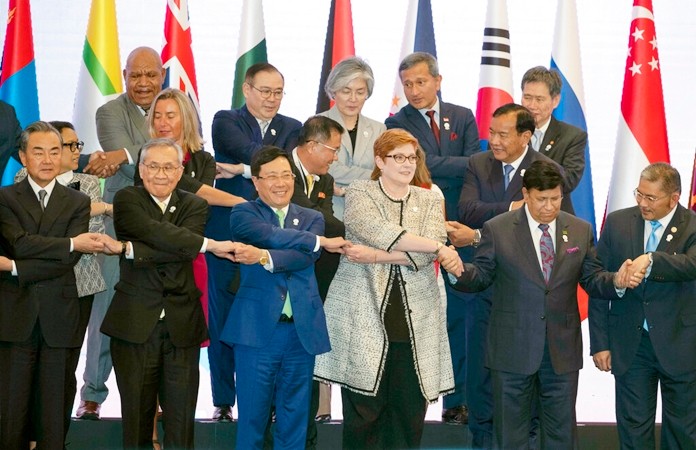
Bangkok (AP) — Asia-Pacific foreign ministers called for the peaceful resolution to regional disputes at Friday’s close of an annual security meeting, which was eclipsed by the U.S.-China rivalry and a deepening trade spat between Japan and South Korea.
Thai Foreign Minister Don Pramudwinai, who chaired the ASEAN Regional Forum, said members supported calls for the resumption of stalled denuclearization talks between the U.S. and North Korea, which have been clouded by Pyongyang’s recent missile launches.
The forum is an offshoot of annual meetings of the 10-member Association of Southeast Asian Nations that adds the participation of key dialogue partners such as the U.S., China, Japan and South Korea.
Tension between Japan and South Korea heated up the meetings, but Don said ministers pushed the two sides to advance talks to seek a compromise. He said the ongoing U.S.-China trade dispute also raised concern.
Japan earlier Friday removed South Korea from a “whitelist” of countries with preferential trade status, prompting Seoul to retaliate in kind. The dispute, with roots in long-standing bitterness over Japan’s actions toward Korea before and during World War II, threatens to disrupt Seoul’s electronics industry by hindering its purchase of semiconductor components.
“At the end of the day, it has to be a win-win. None of us believe in zero-sum efforts. There must be more efforts generated into talks to lessen friction and come up with acceptable solutions,” Don said at a news conference.
South Korea and Japan’s foreign ministers publicly traded barbs at a meeting earlier Friday with their ASEAN counterparts. They both later held talks with U.S. Secretary of State Mike Pompeo on the sidelines of the official meetings, where the enmity was visible. After about half an hour, all three came out of the room and stood in front of the cameras without saying a word and without even shaking hands.
The spat threatens to undo solidarity as Washington would like to present a united front in dealing with China and North Korea.
The U.S. and China rivalry also occupied the meeting’s attention, a day after President Donald Trump intensified pressure on China to reach a trade deal by announcing the imposition of new U.S. tariffs on Chinese imports.
Pompeo defended the tariffs in a speech Friday, saying China has taken advantage of trade. He hit out at Beijing for predatory trade practices and human rights abuses that harm economic development.
His Chinese counterpart, Wang Yi, slammed the new tariffs as damaging for trade talks. He also warned against U.S. interference, especially over China’s territorial claims in the contested South China Sea, saying Beijing will not let anyone stop its peaceful development.
Don acknowledged disputes among claimant countries amid efforts to map out a Code of Conduct governing the busy waterway, but said it was important for all parties to exercise self-restraint and work toward improving the situation in the area.
He said ASEAN’s Indo-Pacific engagement framework adopted by the region’s leaders in June doesn’t believe in domination of power but in every country being equal partners to share in the region’s prosperity.
A series of small bomb blasts in the Thai capital earlier Friday that injured four people caused some trepidation, but Thai officials dismissed the blasts as minor, isolated incidents, and they had no effect on the diplomatic get-together.
Associated Press journalist Grant Peck contributed to the story.
 |
 |
 |





